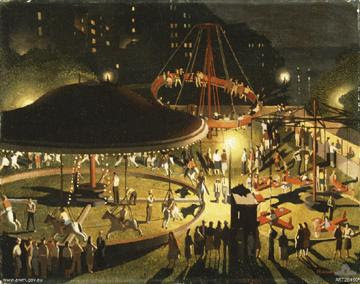Thanks so much for the wonderful suggestions on my art post the other day; I'll reply individually soon. Some of you also liked the pictures I'd found, which was lovely - I really have fallen in love with
Korhinta since I posted it, despite not much liking anything else I've turned up by Vilmos Aba-Novak. Right, books.
Anyone who saw my Top Books list for 2012 will know that I love an autobiography, particularly if it's one by an author from the interwar period. Rachel Ferguson seems such a complex, interesting novelist (and an actress to boot) that I was excited to read her autobiography
We Were Amused (1958). Well, it was definitely an interesting, involving read - and it's made Rachel Ferguson seem more eccentric and complex than I could ever have imagined!
I've only read a couple of her novels -
The Brontes Went to Woolworths and
Alas, Poor Lady - which could scarcely be more different. The former is a madcap tangle about a family who have no boundary between fact and fantasy; the latter is a sombre examination of the fate for aging unmarried women in the period. Both are excellent - you might all be more familiar with
The Brontes Went to Woolworths, and tomorrow I'll be posting a longer excerpt from
We Were Amused which relates to that novel.
Truth be told, I was a bit anxious after the first chunk of the book. I often write here, when reviewing memoirs, that the author mentions miserable events without creating anything remotely like a misery memoir. Well, Rachel Ferguson gets close... with her love for the dramatic and heightened, she describes her mother's childhood as utterly miserable, and her maternal grandmother as a tyrant. Here's a typically bizarre Ferguson paragraph:
'Cumber', as our Greenwood cousins called her ('because she cumbers the earth'), was, as Annie Cave, a member of what Wells has termed that essential disaster of the nineteenth century, the large family. Having married Dr. Cumberbatch, she herself produced five children who lived, a sixth who had the sense to die in infancy, plus at least two who never even succeeded to cradle status. And all this without anaesthetics, in an era of tight lacing.
Details of Cumber's ogredom palled a little, and I confess that I couldn't wait for Ferguson to set aside childhoods - her mother's and her own - and get to the business of living. More particularly, living as an aspiring dancer/actress and, later, writer. These sections were rather wonderful. Ferguson takes her haphazard life rather casually - all the opportunities and achievements which came her way are thrown in without much explanation, so she'll suddenly be working for
Punch, or having her first novel published, or going on a theatrical tour, without much notice. It's definitely better than labouring all these points, but it's a curious division of spoils considering how many pages she devotes to her experiences judging cat shows...
For most of us, I think it's this middle section of the autobiography which will most appeal. It's so full of intriguing details and behind-the-scenes information (come back tomorrow for background info on
The Brontes Went To Woolworths!) which is invariably interesting to those of us who have never published a novel or appeared on the stage. She does expect a lot of knowledge of interwar actors, dancers, and journalists which I am (alas) unable to provide - but I need no prompting when she talks about E.F. Benson, E.M. Delafield, and Violet Hunt.
Even if Rachel Ferguson had no creative career upon which to reflect,
We Were Amused would be special for her striking, surreal turn of phrase. Here is a couple of examples:
Our hall wallpaper, which for some reason was not replaced when we moved in, was a real caution and an abomination in the sight of the Lord: it suggested fir-trees and pineapples in a very bad thunderstorm indeed.
and
Socially Teddington was still of the epoch which invited its doctors to dinner but seldom, if ever, its dentists.
Very amusing! But, if only one could believe that Rachel Ferguson were sufficiently detached! Perhaps it is foolish to expect an author to be detached in their autobiography, but her moments of irony and satire are weighed down by her equally peculiar outlook on many topics. Yes, she may have written that twist about dentists with a grin on her face, but she is deadly serious when she suggests the working class have got too big for their boots and are 'overpaid'. Complaining about the lack of live-in servants feels madly outdated for 1958, she seems faintly insane when writing 'the
only cathedral town that doesn't tire one out is York' (what
can she mean?), and I lost the thread completely when it came to the chapter on ghosts. Ferguson assumes a level of credulity (not to mention a familiarity with famous hauntings of the 1930s) which left me entirely cold towards her my-sister's-friend's-cousin-heard sort of anecdotes about poltergeists and phantom footsteps.
Even stranger, to me, is her total fixation upon London - well, Kensington. She describes a period spent in a different area of London as though she'd been exploring a South American country, or taken a voyage to Moscow. She has no time at all for any of Britain's other cities, towns, and villages. Life begins and ends with Kensington for Ferguson - she'll often assert that somebody is a Kensingtonian, and consider it credentials enough to satisfy the reader. I shall never understand the London-centric mind, and I should probably give up hoping I ever shall.
So, it's a curious mix. It's almost all fun and interesting, but the selection and apportion of pages - not to mention the tone and turn of phrase - certainly mark out Rachel Ferguson as an eccentric. If you'd wondered how much of a departure she found
The Brontes Went To Woolworths, well... if anything, she seems to have toned things down for the novel.


































